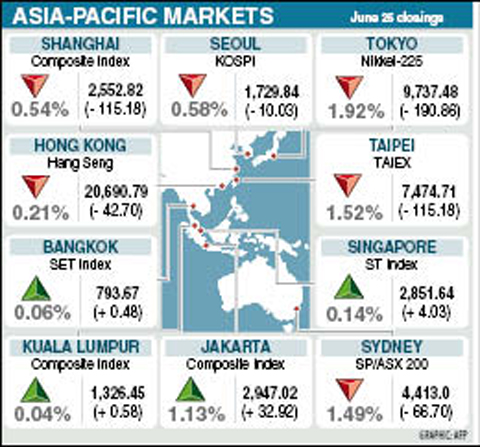Most Asian stocks fell, sending the MSCI Asia-Pacific Index to its third weekly decline in four as a slump in US housing sales triggered concern growth in the world’s biggest economy is faltering.
James Hardie Industries SE, the biggest seller of home siding in the US, declined 2.4 percent in Sydney. Canon Inc, which got about 28 percent of sales in the Americas last year, dropped 6.6 percent in Tokyo. Elpida Memory Inc, the world’s third-biggest maker of computer memory chips, and Tokyo Electron Ltd, the world’s second-biggest market of semiconductor equipment, slumped following brokerage downgrades.
“People are somewhat circumspect about the prospects for global growth,” said Tim Schroeders, who helps manage about US$1.1 billion at Pengana Capital Ltd in Melbourne.

“Doubts about how strong the US recovery is and its trajectory, particularly for the second half of 2010, have increased,” he said.
The MSCI Asia-Pacific Index dropped 0.5 percent. It has lost 4 percent this year on concern Greece and other European countries will struggle to curb their budget deficits and repay debt.
Australia’s S&P/ASX 200 Index dropped 3.1 percent, the most among major benchmark indexes in the Asia-Pacific region, as Macquarie Group Ltd, Australia’s biggest investment bank, declined 11 percent after saying increasingly uncertain markets are weighing on some parts of its business.
Japan’s Nikkei 225 Stock Average declined 2.6 percent as exporters dropped after the yen strengthened for a third week.
China’s Shanghai Composite Index climbed 1.6 percent and Hong Kong’s Hang Seng Index rose 2 percent, bucking the regional decline, after the People’s Bank of China signaled an end to the currency’s two-year-old peg to the dollar one week before a G20 Summit.
Taiwan’s TAIEX index declined 1.5 percent, or 115.18, on Friday to close at 7,474.71, after the central bank on Thursday unexpectedly raised interest rates for the first time since 2008 and told lenders to cap home loans. The index dropped 18.4 points this week.
Taiwanese property stocks declined, with the 35-member construction sub-index dropping 3.7 percent, the most since April 19. Farglory Land Development Co (遠雄建設), the nation’s biggest property developer by market value, slid 4.8 percent to NT$63, the most since April 19. Cathay Real Estate Development Co (國泰建設), the second-largest developer, fell 2.1 percent to NT$11.55, the lowest since June 18.
Chang Hwa Commercial Bank (彰化銀行) climbed 4.9 percent to NT$14.05, the most since June 24 last year, after the nation’s financial regulator approved its application to set up a branch in Kunshan, China.
Powerchip Technology Corp (力晶科技), a maker of computer-memory chips, lost 1.6 percent to NT$4.26 after its board approved plans to sell between 650 million and 800 million new shares locally and overseas, according to its stock exchange filing on Thursday.
Other markets on Friday:
Manila ended 0.55 percent, or 18.49 points, higher from Thursday at 3,352.46.
Wellington slipped 0.50 percent, or 15.36 points, from Thursday to 3,034.11.
Mumbai fell 0.88 percent, or 155.71 points, from Thursday to 17,574.53.

MORE VISITORS: The Tourism Administration said that it is seeing positive prospects in its efforts to expand the tourism market in North America and Europe Taiwan has been ranked as the cheapest place in the world to travel to this year, based on a list recommended by NerdWallet. The San Francisco-based personal finance company said that Taiwan topped the list of 16 nations it chose for budget travelers because US tourists do not need visas and travelers can easily have a good meal for less than US$10. A bus ride in Taipei costs just under US$0.50, while subway rides start at US$0.60, the firm said, adding that public transportation in Taiwan is easy to navigate. The firm also called Taiwan a “food lover’s paradise,” citing inexpensive breakfast stalls

TRADE: A mandatory declaration of origin for manufactured goods bound for the US is to take effect on May 7 to block China from exploiting Taiwan’s trade channels All products manufactured in Taiwan and exported to the US must include a signed declaration of origin starting on May 7, the Bureau of Foreign Trade announced yesterday. US President Donald Trump on April 2 imposed a 32 percent tariff on imports from Taiwan, but one week later announced a 90-day pause on its implementation. However, a universal 10 percent tariff was immediately applied to most imports from around the world. On April 12, the Trump administration further exempted computers, smartphones and semiconductors from the new tariffs. In response, President William Lai’s (賴清德) administration has introduced a series of countermeasures to support affected

CROSS-STRAIT: The vast majority of Taiwanese support maintaining the ‘status quo,’ while concern is rising about Beijing’s influence operations More than eight out of 10 Taiwanese reject Beijing’s “one country, two systems” framework for cross-strait relations, according to a survey released by the Mainland Affairs Council (MAC) on Thursday. The MAC’s latest quarterly survey found that 84.4 percent of respondents opposed Beijing’s “one country, two systems” formula for handling cross-strait relations — a figure consistent with past polling. Over the past three years, opposition to the framework has remained high, ranging from a low of 83.6 percent in April 2023 to a peak of 89.6 percent in April last year. In the most recent poll, 82.5 percent also rejected China’s

PLUGGING HOLES: The amendments would bring the legislation in line with systems found in other countries such as Japan and the US, Legislator Chen Kuan-ting said Democratic Progressive Party (DPP) Legislator Chen Kuan-ting (陳冠廷) has proposed amending national security legislation amid a spate of espionage cases. Potential gaps in security vetting procedures for personnel with access to sensitive information prompted him to propose the amendments, which would introduce changes to Article 14 of the Classified National Security Information Protection Act (國家機密保護法), Chen said yesterday. The proposal, which aims to enhance interagency vetting procedures and reduce the risk of classified information leaks, would establish a comprehensive security clearance system in Taiwan, he said. The amendment would require character and loyalty checks for civil servants and intelligence personnel prior to